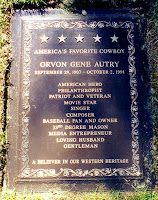Annelisa listens
to
The Horse Show on Rural Radio
Channel 80 (Sirius/XM). She wrote to ask for more information on catching the
hard-to-catch horse in a round pen. Normally, I would expound a bit on what the
guest on that particular program said. Problem is, I can’t figure out which
guest Annelisa heard. So, Annelisa, these
are my thoughts on the hard-to-catch horse.
First, a
basic principle: If you want your horse to make a change, you have to give him a
reason to do so. The hard-to-catch horse is happy being away from you. To
change that, you need to convince him that it’s better to be with you. The round pen is a great place to do this
because, in order to stay away from you, the horse has to keep moving, and
eventually he looks for an alternative to wasting all of that precious energy.
So here’s
the basic technique. With the horse loose in the round pen, bring up your
energy and focus it on the horse’s hindquarters. Mentally push on them, move
toward them, throw a rope at them, whatever you need to do to be sure the horse
feels that energy pushing on his hind end. One of two things will happen. Either the
horse will squirt away from you and exercise his flight response or he will disengage
his hindquarters, which is a fancy way of saying he will swing his rear end
away from you and face up. If the horse runs away, keep the pressure up until
you see that he wants to slow down. Let him stop and begin the session again.
The facing
up is what you want from the horse because that is an act of submission, an offering
of sorts. What you do when he begins to face you is critical. You instantly turn off the pressure and start
backing away him. Remember, you began this session by pushing energy toward the
horse’s hind end; now you’re pulling energy from his front end. Pushing energy
has a driving effect and pulling energy has a drawing effect. You want the
horse to continue this change he has made in turning toward you by actually
taking a step toward you, then another, then another. It’s easy for him to do
this as long as you are backing away. When you begin to see other signs of
submission such as licking and chewing or lowering the head, you can stop
moving backward and let the two of you rest in that position.
So where are
we now? The horse has decided that, at least for the moment, it is better to be
with you than away from you. The pressure to move his hindquarters is gone and
he’s felt this urge to move toward you. This
is an important mental shift and the moment it occurs is called joining up or
hooking on. It’s a fragile moment and getting greedy can undo what you’ve
accomplished, so go slowly. If you are still getting these offerings of
submission, such as lowering the head, licking and chewing, softening the eye, or blinking, it is a good time to give your horse a gentle scratch on the
forehead. Don’t dwell there; just get in,
scratch, and get out. Turn and walk slowly away from the horse. Feel the
invisible connection between you. The horse should follow. Turn and scratch him
while he’s still mentally connected to you . When you’ve both gotten
comfortable with this little dance, you are done for the day.
Whaaaa? That’s
right. You are not going to do anything further with the horse on that day. This
is called ending on a good note and it may be the hardest part of training a
horse. Think of it as an investment in the future, a way of patching up the
foundation of your relationship. To continue that metaphor, the mortar needs
time to set. You are going to leave your horse on a good note in order for
things to firm up in his mind. Remember, you’ve rocked his world a bit. You are
not the same person he thought you were. He needs time to process that. The
idea beginning to form in his mind is that being with you could be his first
choice rather than his last resort.
Tomorrow, you
can repeat he whole thing again, paying special attention to how you use your
energy and how he responds to it. You’ll be better and he will probably respond
more readily. But maybe not. Horses always test us and progress isn’t perfectly
linear. Don’t let that upset you because that negative energy will also be felt
by the horse and will interfere with the other signals he’s picking up from
you. The time will come, maybe on that
second day or maybe later, when you can put his halter on him and walk him
around a bit. As before, don’t get greedy about this. Surprise him by ending on
a good note, when he’s relaxed and willing to do more. In the future, mix it up
like that. Some days, you’ll catch him to go do something. Other days, you’ll
catch him just to give him a good scratch or a carrot. You will keep your horse
engaged and interested in you – and easier to catch – if you are just a little unpredictable
in your daily activities with him.
Rick





